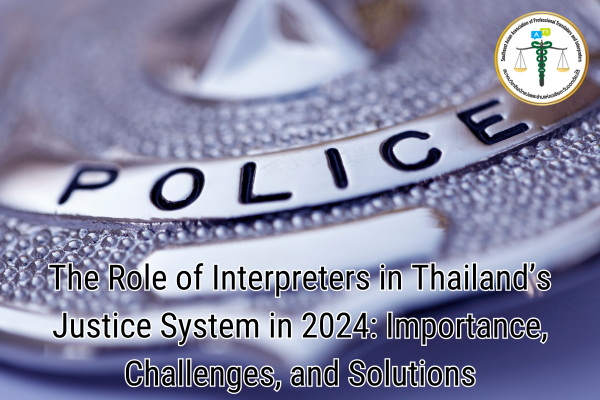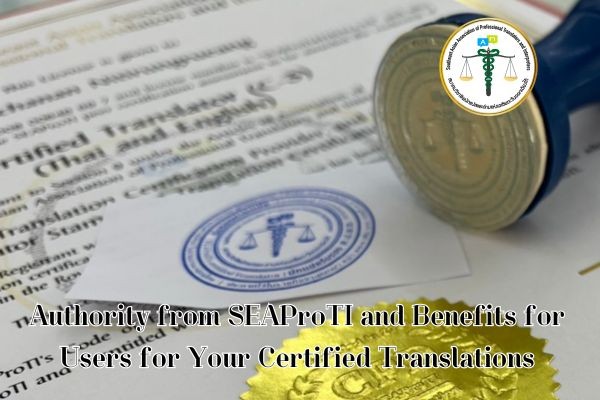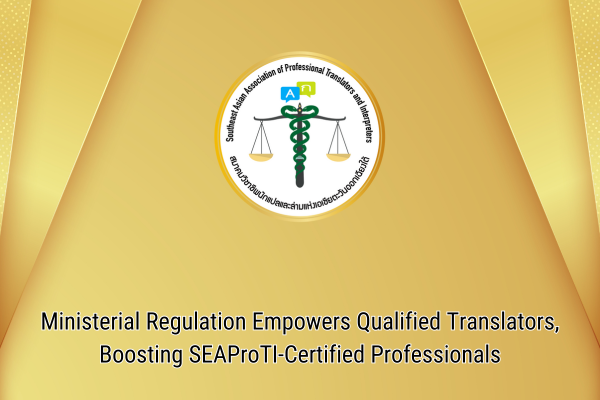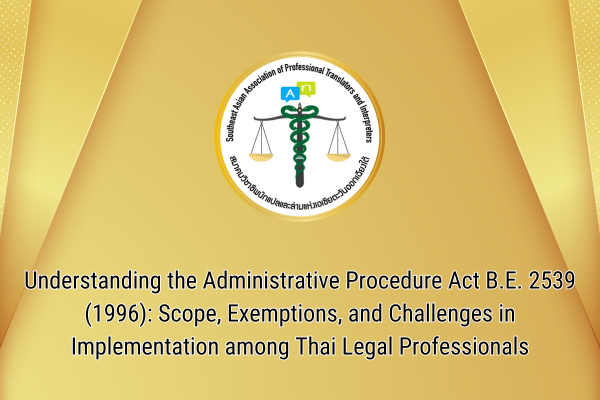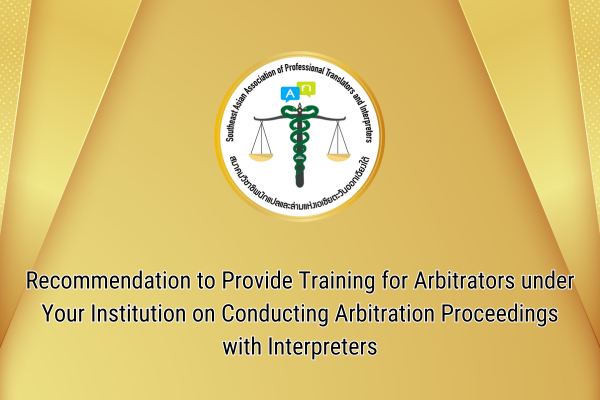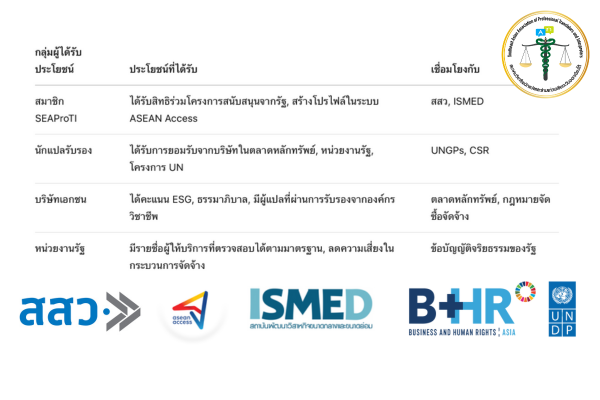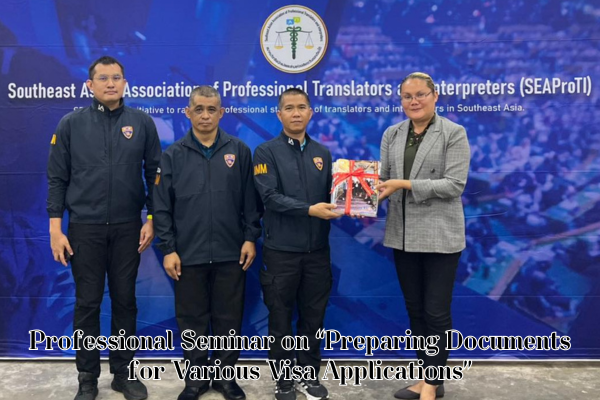The Role of Interpreters in Thailand’s Justice System in 2024: Importance, Challenges, and Solutions
29 December 2024, Bangkok – In 2024, the role of interpreters in Thailand’s justice system has become increasingly vital amidst the country’s growing linguistic and cultural diversity. Accurate and clear communication among all parties in legal proceedings is a cornerstone of justice. However, interpreters in the justice system face numerous challenges that affect the quality and efficiency of their work. This article explores the importance of interpreters, the challenges they encounter, and proposed solutions to enhance their standards and performance in Thailand.
The Importance of Interpreters in the Justice System
Interpreters act as a bridge for communication between individuals who speak different languages. In the context of the justice system, any miscommunication or misunderstanding can have severe consequences on case outcomes and the rights of involved parties. Therefore, high-quality interpretation plays a crucial role in ensuring equity and justice for everyone involved.
Thailand’s linguistic and cultural diversity necessitates interpreters capable of precise translation and contextual understanding. Without competent interpreters, defendants, witnesses, or other stakeholders may be unable to fully convey their perspectives, potentially leading to unjust case resolutions.
Challenges Faced by Interpreters
Despite their significant role, interpreters in the justice system face several issues that impact the quality and effectiveness of their work, including:
1. Lack of an Internationally Recognized Certification System
Thailand lacks an internationally recognized certification system for interpreters in the justice system. This absence results in inconsistent interpreter quality and reliability. Additionally, insufficient specialized training for legal interpretation presents a major barrier to effective performance.
2. Complexity of Legal Terminology
Legal terminology often comprises specific terms that lack direct equivalents in Thai. Accurate translation of these terms requires an in-depth understanding of legal contexts. Misinterpretation or inaccurate translation can lead to misunderstandings and affect case outcomes.
3. Cultural Differences in Translation Work
Thailand’s culture emphasizes politeness and indirect communication, which can conflict with the straightforward and explicit nature required in legal proceedings. Misunderstanding cultural contexts may lead to errors in interpretation.
4. Lack of Resources and Technology
Some interpreters lack access to modern tools and technology, such as real-time translation software or high-quality audio equipment. These resource shortages hinder interpreters’ efficiency and the accuracy of their translations.
5. Psychological Stress and Pressure
Working in high-pressure environments, such as courtrooms or during testimony in sensitive cases, can take a toll on interpreters’ mental health. Stress and pressure from such work environments may compromise the quality and efficiency of interpretation.
Proposed Solutions
To enhance the quality and standards of interpreters in Thailand’s justice system, the following measures should be considered:
1. Developing a Certification System
A comprehensive certification system for interpreters should be established, covering various aspects of legal interpretation, such as court proceedings, witness testimony, and legal document translation. Certification should be conducted by professional organizations, such as the Southeast Asian Association of Professional Translators and Interpreters (SEAProTI).
2. Mandatory Training Programs
Interpreters working in the justice system should undergo mandatory training that includes legal ethics, courtroom practices, and real-world interpretation techniques. Such training ensures interpreters are well-prepared and understand the specific requirements of the justice system.
3. Continuous Professional Development
A system of ongoing learning and professional development should be implemented, including participation in seminars, workshops, and online learning platforms. This enables interpreters to enhance their skills and acquire new knowledge continuously.
4. Creating a Legal Terminology Dictionary
Relevant authorities should develop a comprehensive and accessible legal terminology dictionary or database. This resource would enable interpreters to quickly and accurately access necessary terms and information.
5. Training in Cross-Cultural Communication
Interpreters should receive training on cultural differences and methods to address these differences effectively in their work. This ensures translations are accurate and appropriate for the context.
6. Investing in Technology
Relevant organizations should invest in technologies that improve translation efficiency, such as real-time translation tools and high-quality audio equipment. These tools enhance the accuracy and speed of interpreters’ work.
7. Psychological Support
Psychological support services, such as counseling and stress management programs, should be made available to interpreters. This helps them cope with the pressures of their work environments and maintain high performance levels.
Conclusion
Enhancing the quality and standards of interpreters in Thailand’s justice system is crucial to ensuring smooth and fair legal proceedings. Addressing these challenges requires developing certification systems, comprehensive training programs, managing legal terminology, providing psychological support, and investing in resources and technology. By implementing these measures, interpreters in Thailand’s justice system can perform effectively and contribute to the promotion of justice in society.
About SEAProTI’s certified translators, translation certification providers, and certified interpreters:
The Southeast Asian Association of Professional Translators and Interpreters (SEAProTI) has officially announced the criteria and qualifications for individuals to register as “Certified Translators,” “Translation Certification Providers,” and “Certified Interpreters” under the association’s regulations. These guidelines are detailed in Sections 9 and 10 of the Royal Thai Government Gazette, issued by the Secretariat of the Cabinet under the Office of the Prime Minister of the Kingdom of Thailand, dated July 25, 2024, Volume 141, Part 66 Ng, Page 100.
To read the full publication, visit: the Royal Thai Government Gazette
บทบาทของล่ามในกระบวนการยุติธรรมไทยในปี 2567: ความสำคัญ ปัญหา และแนวทางแก้ไข
29 ธันวาคม 2567, กรุงเทพ – ในปี 2567 บทบาทของล่ามในกระบวนการยุติธรรมของประเทศไทยมีความสำคัญเพิ่มมากขึ้น ท่ามกลางความหลากหลายทางภาษาและวัฒนธรรมที่เพิ่มสูงขึ้นในสังคมไทย การสื่อสารที่ถูกต้องและชัดเจนระหว่างผู้เกี่ยวข้องทุกฝ่ายในกระบวนการทางกฎหมายถือเป็นรากฐานสำคัญของความยุติธรรม อย่างไรก็ตาม การทำหน้าที่ของล่ามในกระบวนการยุติธรรมยังคงเผชิญกับปัญหาและอุปสรรคหลายประการที่ส่งผลต่อประสิทธิภาพและความเป็นธรรมในกระบวนการนี้ บทความนี้จะวิเคราะห์ความสำคัญของล่าม ปัญหาที่ล่ามต้องเผชิญ และเสนอแนวทางแก้ไขเพื่อยกระดับมาตรฐานการทำงานของล่ามในประเทศไทย
ความสำคัญของล่ามในกระบวนการยุติธรรม
ล่ามเป็นสะพานเชื่อมต่อการสื่อสารระหว่างผู้พูดที่มีภาษาแตกต่างกัน โดยเฉพาะในบริบทของกระบวนการยุติธรรม การสื่อสารที่ผิดพลาดหรือคลาดเคลื่อนอาจส่งผลกระทบร้ายแรงต่อการตัดสินคดีและสิทธิของผู้เกี่ยวข้อง การทำหน้าที่ของล่ามที่มีคุณภาพจึงมีความสำคัญอย่างยิ่งในการสร้างความเท่าเทียมและความยุติธรรมให้กับทุกฝ่ายในกระบวนการ
ประเทศไทยเป็นสังคมที่มีความหลากหลายทางภาษาและวัฒนธรรม ด้วยเหตุนี้ ความสามารถของล่ามในการแปลอย่างถูกต้องและเข้าใจบริบทจึงมีบทบาทสำคัญในคดีที่เกี่ยวข้องกับคนต่างชาติ ชาวชนเผ่า หรือผู้ที่พูดภาษาไทยไม่คล่อง การขาดล่ามที่มีคุณภาพอาจทำให้ผู้ถูกกล่าวหาหรือพยานไม่สามารถแสดงข้อเท็จจริงได้อย่างเต็มที่ และอาจนำไปสู่การตัดสินคดีที่ไม่เป็นธรรม
ปัญหาที่ล่ามเผชิญในการปฏิบัติหน้าที่
แม้ว่าล่ามจะมีบทบาทสำคัญในกระบวนการยุติธรรม แต่ยังคงมีปัญหาหลายประการที่ส่งผลกระทบต่อคุณภาพและประสิทธิภาพในการทำงาน ดังนี้:
1. ขาดระบบการรับรองมาตรฐานที่เป็นสากล
ในประเทศไทยยังไม่มีระบบการรับรองมาตรฐานสำหรับล่ามในกระบวนการยุติธรรมที่สอดคล้องกับมาตรฐานสากล การขาดมาตรฐานดังกล่าวทำให้คุณภาพของล่ามมีความหลากหลายและขาดความสม่ำเสมอ อีกทั้งการขาดการฝึกอบรมที่เฉพาะเจาะจงสำหรับล่ามในด้านกฎหมายยังเป็นอุปสรรคสำคัญ
2. ความซับซ้อนของคำศัพท์ทางกฎหมาย
คำศัพท์ทางกฎหมายมักเป็นคำเฉพาะที่ไม่มีคำแปลตรงตัวในภาษาไทย การแปลคำศัพท์เหล่านี้จำเป็นต้องอาศัยความเข้าใจลึกซึ้งในบริบททางกฎหมาย การแปลผิดหรือไม่ถูกต้องอาจนำไปสู่ความเข้าใจผิดและส่งผลกระทบต่อผลลัพธ์ของคดี ล่ามที่เป็นบุคคลทั่วไปอาจไม่สามารถแปลภาษากฎหมายได้ถูกต้อง ทำให้กระบวนการพิจารณาเกิดความคลาดเคลื่อนในความเข้าใจได้
3. ความแตกต่างทางวัฒนธรรมในงานแปล
ประเทศไทยมีวัฒนธรรมที่เน้นความสุภาพและการสื่อสารแบบอ้อมค้อม ซึ่งอาจขัดแย้งกับลักษณะของการแปลในกระบวนการยุติธรรมที่ต้องการความชัดเจนและตรงไปตรงมา การไม่เข้าใจบริบททางวัฒนธรรมอาจนำไปสู่ข้อผิดพลาดในการแปล
4. การขาดแคลนทรัพยากรและเทคโนโลยี
ล่ามในกระบวนการยุติธรรมบางรายยังขาดเครื่องมือและเทคโนโลยีที่ทันสมัย เช่น ซอฟต์แวร์แปลภาษาแบบเรียลไทม์หรืออุปกรณ์เสียงที่มีคุณภาพ การขาดแคลนทรัพยากรเหล่านี้ส่งผลให้ล่ามไม่สามารถปฏิบัติงานได้อย่างเต็มประสิทธิภาพ
5. ปัญหาด้านจิตวิทยาและความเครียด
การทำงานในสภาพแวดล้อมที่มีความกดดันสูง เช่น ศาลหรือการให้ปากคำในคดีที่มีความรุนแรง อาจส่งผลกระทบต่อสภาพจิตใจของล่าม ความเครียดจากงานดังกล่าวอาจลดทอนคุณภาพและประสิทธิภาพในการทำงาน
6. บางศาลไม่มีล่ามประจำ และค่าตอบแทนล่ามที่ไม่เป็นแรงจูงใจ
ต้องขอความร่วมมือจากหน่วยงานอื่น ซึ่งอาจทำให้การดำเนินคดีล่าช้า กฎหมายไม่ได้กำหนดวิธีการจัดหาล่ามที่ชัดเจน ทำให้ไม่มีหน่วยงานรองรับการจัดหาล่ามโดยตรง บ่อยครั้งที่ล่ามไม่ได้รับค่าป่วยการ ทำให้ขาดแรงจูงใจในการปฏิบัติหน้าที่
แนวทางแก้ไขปัญหา
เพื่อยกระดับคุณภาพและมาตรฐานการทำงานของล่ามในกระบวนการยุติธรรมไทย ควรมีการดำเนินการตามแนวทางดังต่อไปนี้:
1. พัฒนาระบบการรับรองมาตรฐาน
ควรจัดตั้งระบบการรับรองมาตรฐานสำหรับล่ามที่ครอบคลุมด้านการแปลในกระบวนการยุติธรรม เช่น การแปลในศาล การแปลคำให้การของพยาน และการแปลเอกสารทางกฎหมาย การรับรองควรดำเนินการโดยหน่วยงานที่มีความเชี่ยวชาญ เช่น สมาคมวิชาชีพนักแปลและล่ามแห่งเอเชียตะวันออกเฉียงใต้ (SEAProTI)
2. การฝึกอบรมบังคับ
ล่ามที่ทำงานในกระบวนการยุติธรรมควรผ่านการฝึกอบรมที่ครอบคลุม เช่น การอบรมด้านจริยธรรมทางกฎหมาย การปฏิบัติในศาล และการแปลในสถานการณ์จริง เพื่อให้ล่ามมีความพร้อมและเข้าใจข้อกำหนดของกระบวนการยุติธรรมอย่างแท้จริง
3. การพัฒนาวิชาชีพอย่างต่อเนื่อง
ควรมีระบบการเรียนรู้และการฝึกอบรมเพิ่มเติม เช่น การเข้าร่วมสัมมนา การฝึกอบรมเชิงปฏิบัติการ และการเรียนรู้ผ่านแพลตฟอร์มออนไลน์ เพื่อให้ล่ามสามารถพัฒนาทักษะและความรู้ใหม่ๆ อย่างต่อเนื่อง
4. การจัดทำพจนานุกรมกฎหมาย
หน่วยงานที่เกี่ยวข้องควรจัดทำพจนานุกรมหรือฐานข้อมูลคำศัพท์ทางกฎหมายที่ครอบคลุมและใช้งานง่าย เพื่อให้ล่ามสามารถเข้าถึงคำศัพท์และข้อมูลที่จำเป็นได้สะดวก
5. การอบรมเรื่องการสื่อสารข้ามวัฒนธรรม
ล่ามควรได้รับการฝึกอบรมเกี่ยวกับความแตกต่างทางวัฒนธรรมและวิธีการจัดการความแตกต่างเหล่านี้ในงานแปล เพื่อให้การแปลมีความถูกต้องและเหมาะสมกับบริบท
6. การลงทุนในเทคโนโลยี
หน่วยงานที่เกี่ยวข้องควรลงทุนในเทคโนโลยีที่ช่วยเพิ่มประสิทธิภาพการแปล เช่น เครื่องมือแปลภาษาแบบเรียลไทม์ และอุปกรณ์เสียงที่มีคุณภาพสูง
7. การสนับสนุนด้านจิตวิทยา
ควรจัดให้มีการสนับสนุนด้านจิตวิทยาสำหรับล่าม เช่น การให้คำปรึกษาและการจัดการความเครียด เพื่อช่วยให้ล่ามสามารถรับมือกับความกดดันในการทำงานได้อย่างมีประสิทธิภาพ
บทสรุป
การพัฒนาคุณภาพและมาตรฐานของล่ามในกระบวนการยุติธรรมไทยเป็นสิ่งสำคัญอย่างยิ่ง เพื่อให้การดำเนินกระบวนการยุติธรรมเป็นไปอย่างราบรื่นและเป็นธรรม การแก้ไขปัญหาเหล่านี้ควรเริ่มจากการพัฒนาระบบการรับรองมาตรฐาน การฝึกอบรมที่ครอบคลุม การจัดการคำศัพท์ทางกฎหมาย การสนับสนุนด้านจิตวิทยา และการลงทุนในทรัพยากรและเทคโนโลยี ด้วยแนวทางเหล่านี้ ล่ามในกระบวนการยุติธรรมไทยจะสามารถทำงานได้อย่างมีประสิทธิภาพและช่วยส่งเสริมความยุติธรรมในสังคมได้อย่างแท้จริง
เกี่ยวกับนักแปลรับรอง ผู้รับรองการแปล และล่ามรับรองของสมาคมวิชาชีพนักแปลและล่ามแห่งเอเชียตะวันออกเฉียงใต้
สมาคมวิชาชีพนักแปลและล่ามแห่งเอเชียตะวันออกเฉียงใต้ (SEAProTI) ได้ประกาศหลักเกณฑ์และคุณสมบัติผู้ที่ขึ้นทะเบียนเป็น “นักแปลรับรอง (Certified Translators) และผู้รับรองการแปล (Translation Certification Providers) และล่ามรับรอง (Certified Interpreters)” ของสมาคม หมวดที่ 9 และหมวดที่ 10 ในราชกิจจานุเบกษา ของสำนักเลขาธิการคณะรัฐมนตรี ในสำนักนายกรัฐมนตรี แห่งราชอาณาจักรไทย ลงวันที่ 25 ก.ค. 2567 เล่มที่ 141 ตอนที่ 66 ง หน้า 100 อ่านฉบับเต็มได้ที่: นักแปลรับรอง ผู้รับรองการแปล และล่ามรับรอง


